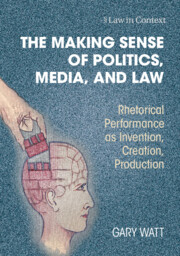The Making Sense of Politics, Media, and Law
From Trump’s ‘make America great again’ to Johnson’s ‘build back better’, performative politicians use The Making Sense to persuade their public audiences. Law ‘makers’ do it too: A courtroom trial is a ‘truth factory’ in which facts are not found but forged. The ‘court of popular opinion’ is another such factory, though its processes are often flawed and its products faulty. Where courts of law aim to make civil peace, ‘trial by Twitter’ makes civil strife. Even in ‘mainstream’ media, journalists make news for public consumption, so that all news is to an extent ‘fake news’. In a world of making, how can we separate craft from craftiness? With insights from disciplines including law, politics, rhetoric, media studies, psychology, sociology, marketing, and performance studies, The Making Sense of Politics, Media, and Law offers a constructive way to approach controversies from transgender identity to cancel culture. This title is also available as open access on Cambridge Core.
Gary Watt is Professor in the School of Law, University of Warwick. He is a National Teaching Fellow, having been named national ‘Law Teacher of the Year’ (2009). His rhetoric workshops for the Royal Shakespeare Company informed his book Shakespeare’s Acts of Will (The Arden Shakespeare) and the present book arises from the award of a Leverhulme Major Research Fellowship (2019-2022). He is general editor of Bloomsbury’s A Cultural History of Law and founding co-editor of the journal Law and Humanities.

